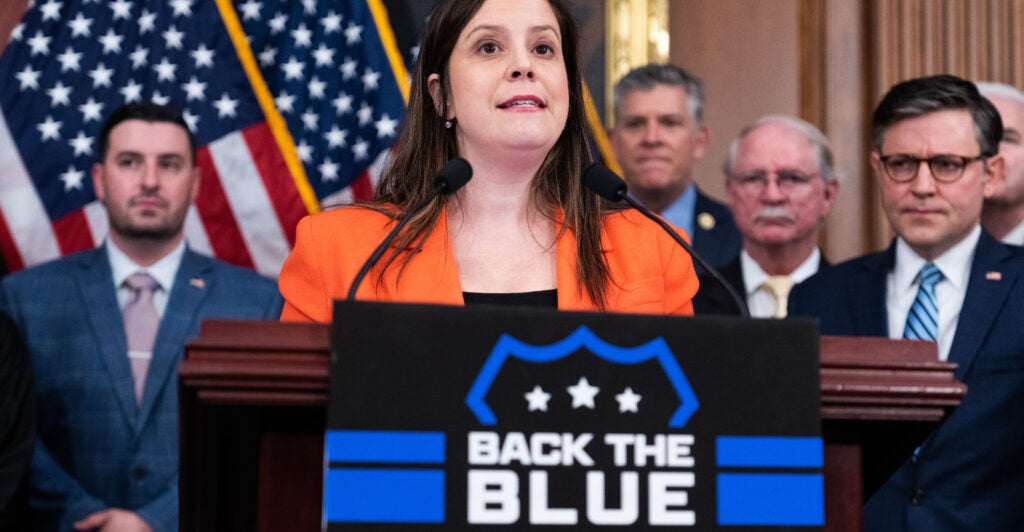Americans Should Thank a Cop During National Police Week—and the Rest of the Year, Too
Cully Stimson / John G. Malcolm /
This week, Atlanta cops embodied the city’s motto, “Resurgens,” which means “rising again.”
Responding to a distress call about an armed man in the Capitol View neighborhood, three cops were shot in the line of duty on May 11. This National Police Week (May 12-18), we should be grateful that it appears that they will all recover.
Many cops aren’t so lucky. Sgt. Heather Jayne Glenn, a 47-year-old, 20-year veteran of a rural Indiana police department, was killed in the line of duty on July 3, 2023, by an armed domestic-violence suspect. She’s not alone.
As of April 30, the Fraternal Order of Police reported that 20 cops have already been fatally shot in 2024. Assaults on police officers are at a 10-year high, according to a recent FBI report.
Police departments around the country are feeling the effects. High crime rates in inner cities, hostility from left-wing activists in some communities, and severe budget cuts have adversely affected morale and retention, leaving many departments short-staffed and struggling to ensure public safety.

Flanked by fellow Republican lawmakers, House Republican Conference Chairwoman Rep. Elise Stefanik, R-N.Y., speaks at a news conference Wednesday at the Capitol at an event recognizing law enforcement as part of National Police Week. (Photo: Tom Williams/CQ-Roll Call/Getty Images)
Take Washington, D.C., for example. After the city council cut the budget of the Metropolitan Police Department in 2020, the department lost more than 1,000 officers, and currently has a 500-officer shortfall. Not coincidently, crime rates since 2020 in the District of Columbia have spiked, including a 35% increase in homicides last year compared with 2022, an 82% increase year-over-year in motor vehicle theft, and an overall violent-crime increase of 39%.
That has left officers worse off and facing dangerous situations. In February, for example, three officers were shot in broad daylight. At the time, D.C. Police Union Chairman Gregg Pemberton told reporters:
We’re going to try to keep these neighborhoods safe, as safe as we can. It’s just impossible for us to do our jobs under these kinds of conditions.
Aware that rising crime rates are their political Achilles’ heel, liberals are now boasting about the dip in crime rates in blue cities. What they don’t acknowledge, however, is that those small decreases are dwarfed by the massive spike in crime rates that began in 2018 and the rates remain unacceptably high.
Those spikes coincide with the efforts of anti-police activists to mainstream the “defund the police” movement and stoke hostility against cops in some communities of color. And crime rates have only been made worse by the work, in several jurisdictions, of so-called progressive prosecutors (we think the term “rogue prosecutors” is more apt) implementing policies that undercut the efforts of law enforcement officers.
Take Philadelphia, for example. In the five years before Larry Krasner was elected district attorney, there was an average of 271 homicides per year. In the first five years of his tenure in office, there have been an average of 457 per year. That’s an “extra” 186 dead bodies per year.
The same is true in Chicago, New York, Los Angeles, St. Louis, and other major cities.
“Rogue Prosecutors,” a recent book that one of us (Cully Stimson) co-authored, details how more than 70 prosecutors—whose campaigns were funded or inspired by leftist billionaire George Soros and other wealthy, left-wing activists—have implemented pro-criminal, anti-victim policies. The result across the country has been a system that emboldens criminals, treats the police as the culprits, and ignores the millions of real victims across the country.
Although those prosecutors only represent a small portion of the 2,300 elected district attorneys across the country, by population, they are responsible for enforcing the criminal laws of jurisdictions where 1 in 5 Americans live. Police officers and the residents of those communities deserve better.
After the terrorist attacks on Sept. 11, 2001, it was common to thank members of the military, law enforcement, and first responders. But a sense of gratitude for those willing to risk paying the ultimate price in the service of justice has since dissipated in some segments of society.
That’s regrettable. An ordered society depends on adherence to the rule of law, and public safety does not happen by itself, but instead requires sacrifice. Indeed, without patriotic men and women from all backgrounds taking an oath to defend the Constitution and laws of this great country and to serve and protect their communities, our world would be unrecognizable.
During this National Police Week, take a moment and think about how your safety is directly affected by local, state, and federal law enforcement officers who risk their lives daily and stand astride the thin blue line protecting the public from those who would do them harm.
And then when you see an officer, thank him or her for serving to protect you.
